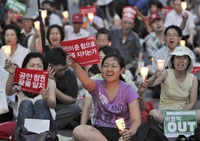Violent protests in store for Bush during his visit to South Korea
Thousands of police stood guard with riot gear and bomb-sniffing dogs across the South Korean capital Tuesday to maintain order ahead of expected protests marking the arrival of U.S. President George W. Bush.

Some 18,300 officers were deployed across Seoul, the National Police Agency said, ahead of both pro- and anti-Bush rallies that organizers claim will draw tens of thousands of demonstrators.
Bush held off on visiting Seoul earlier this year while protesters were staging nightly candlelight vigils and clashing with riot police in anger over government plans to resume imports of American beef.
The protests have since faded and meat shipments began. But Bush's arrival is shaping up to be a new flash point as anti-government demonstrators say they will raise their cries again, facing off against pro-U.S. groups planning a show of support for the country's longtime ally.
South Koreans remain generally positive in public opinion surveys about the United States, which helped repel North Korea in the 1950-53 Korean War and still deploys some 28,500 troops on the Korean Peninsula to deter an attack.
Voters elected conservative, pro-American president Lee Myung-bak, who took office in February with promises to patch up relations with Washington that became strained under Seoul's previous decade of liberal governments.
Just hours before Lee's April meeting with Bush in Washington, South Korea agreed to lift a ban on American beef that was imposed after the United States' first case of mad cow disease was discovered in late 2003. Lee's government said it would allow virtually unlimited imports.
The announcement set off a firestorm at home, setting the stage for weeks of angry street rallies fueled by a perception that the government ignored public concerns and caved in to U.S. pressure in Lee's haste to cozy up to the Americans.
While the rallies were never overtly anti-American and focused on grievances with Lee, the candles were reminiscent of a series of anti-U.S. demonstrations that erupted in 2002 after two girls were killed in an accident with a U.S. military vehicle.
The protests mostly died down after Seoul won amendments to the beef deal that ban American meat from older cattle and include other safeguards. U.S. beef imports have resumed, although many larger South Korean stores and restaurants have refused to serve the meat due to the backlash.
Bush had been widely expected to come to Seoul last month while in Asia for a Group of Eight summit in Japan, but he didn't make a visit, apparently waiting for the demonstrations to calm.
His scheduled arrival Tuesday rekindled the issue, however. The coalition that organized the earlier protests predicted it would gather 10,000 people for another candlelight vigil in central Seoul demanding that the beef deal be renegotiated yet again.
At the same time, pro-U.S. groups planned a Christian prayer service in front of Seoul City Hall that organizers claimed would draw 50,000 people, while another conservative group said its supporters would march near the protest rally carrying pictures of Bush.
Before he arrived, Bush defused what could have been another rallying cry for protests that would have spanned all factions of Korean society involving the country's long-simmering territorial dispute with Japan.
The issue recently flared up after a Japanese educational manual said Japan's students should be taught about the dispute over the South Korean-controlled islets, known as Dokdo in Korean and Takeshima in Japanese.
The U.S. Board of Geographic Names then injected itself into the dispute by altering a listing of the status of the islets from South Korean to "non-designated sovereignty," prompting anger in South Korea that could have overshadowed Bush's visit.
However, the president soothed Seoul's concerns last week by taking the unexpected step of asking the board to change the listing back.
Subscribe to Pravda.Ru Telegram channel, Facebook, RSS!





